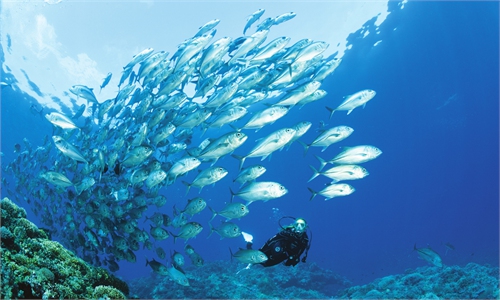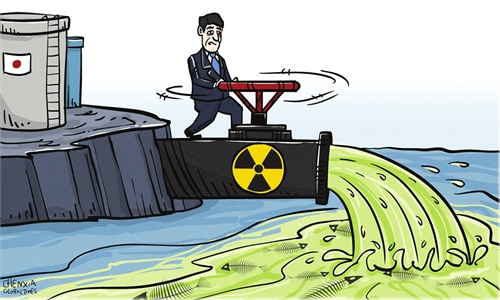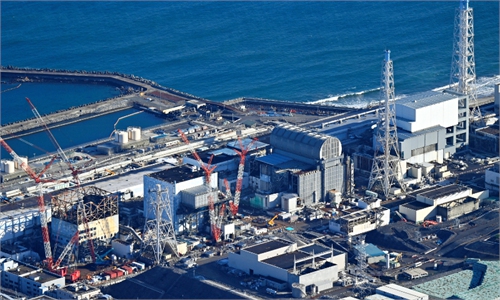IN-DEPTH / IN-DEPTH
GT investigates: Japan’s irresponsible dumping plan ‘latest stain on shameful record of environmental destruction’
Lingering threat
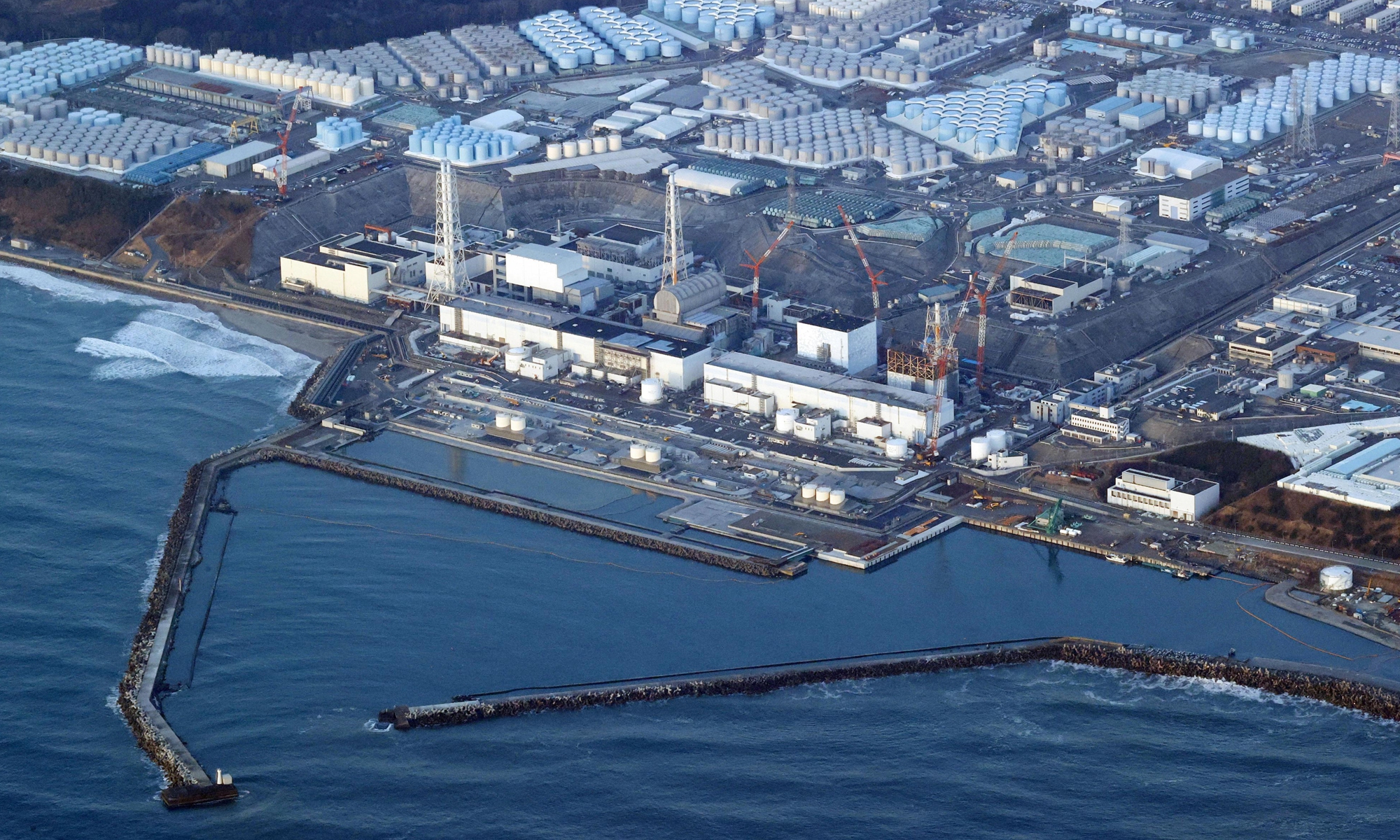
An aerial view of the Fukushima Daiichi nuclear power plant in Fukushima Prefecture on March 17, 2022. Photo: VCG
Editor's Note:In the face of the outcry from the international community, serious concerns expressed by neighboring nations, and strong opposition even from Japanese society, Japan remains committed to carrying out its plan to dump nuclear-contaminated wastewater into the Pacific Ocean. This irresponsible and selfish decision has drawn widespread criticism which the Japanese government has chosen to ignore. In this series, the Global Times will closely look into how this decision was made, what impact it will have on the environment and people's health, as well as the political deals made and lobbying work done by the Japanese government in Western countries.
In this second installment, the Global Times spoke to experts both in Japan and in other countries on the foreseeable irreversible damage to maritime life and human health that will be caused by the nuclear-contaminated wastewater dumping plan; and also delves into Japan's shameful record on ecological environmental damage.
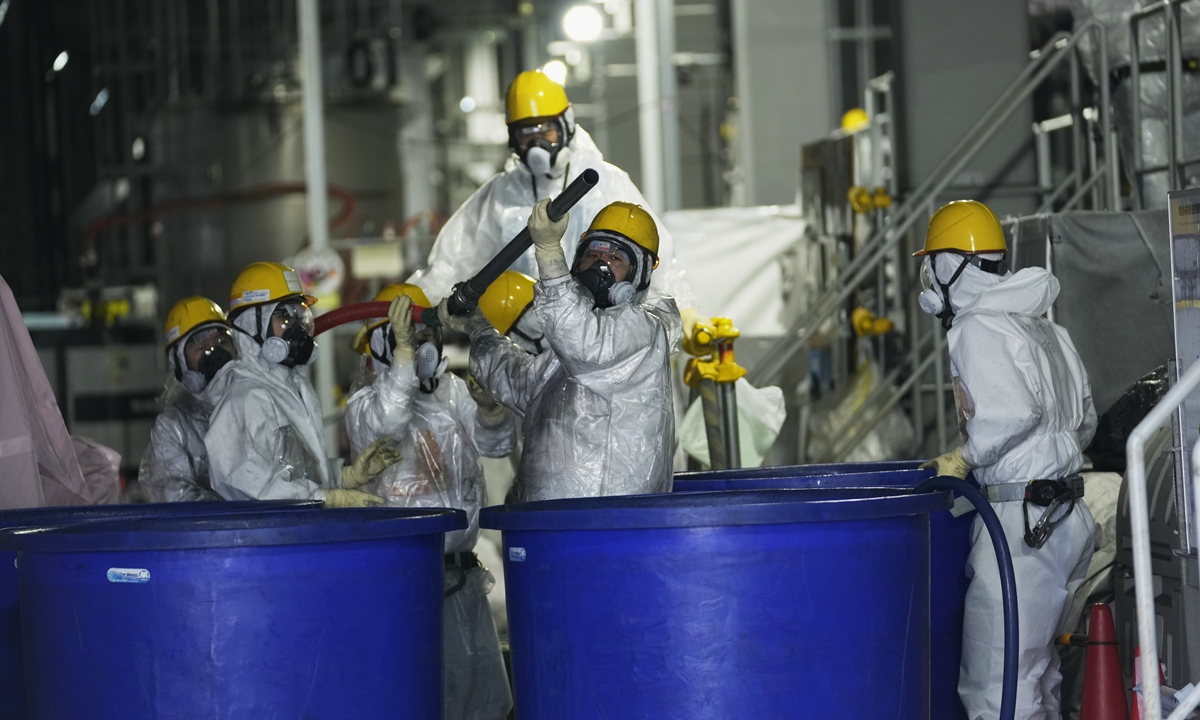
Workers in hazmat suits work inside a facility with equipment to remove radioactive materials from nuclear-contaminated wastewater at the Fukushima Daiichi nuclear power plant, on March 3, 2022.
Calls demanding for Japan to scrap its plan to dump more than 1 million tons of nuclear-contaminated wastewater from the Fukushima nuclear plant into the sea this spring or summer are getting louder not only in Japan but also in neighboring countries and the international community, as there is still no sign that the Japanese government intends to halt its intended plan.The latest news regarding the Fukushima nuclear plant paints an alarming picture of the conditions at the facility. Japan's Asahi Shimbun said in a recent report that an increasing amount of sewage sludge tainted with radioactive substances emanating from the Fukushima nuclear disaster is pushing the storage facility to its limit.
High Integrity Containers (HICs), which are storage vessels made of polyethylene and filled with sludge, are currently being held inside the temporary storage facility. The sludge is to be stored there temporarily until a decision is made on how to dispose of it.
While the Kishida administration and the Tokyo Electric Power Company (TEPCO), the Fukushima Daiichi NPS operator, have worked hard to peddle a narrative on the safety of Japan's plan to dump the nuclear-contaminated wastewater into the sea, both in Japan and neighboring countries did not buy the reassurance with relevant independent research and data warning a long-lasting impact from the intended radioactive wastewater dump.
Analysts noted that the Japanese government's irresponsible plan to deal with the contaminated wastewater will be the latest stain on its shameful record of environmental destruction and the country will be held accountable for the damages caused to the international community.
Irreversible damage
In January, the Japanese government and TEPCO announced the plan to begin dumping wastewater in the spring or summer this year. With no specific date announced, construction work for the plan is reportedly underway to install an undersea tunnel and other necessary disposal facilities.
Although TEPCO claimed that the wastewater will be treated using a technology known as ALPS to remove the most radioactive materials, it still contains tritium, a naturally occurring radioactive form of hydrogen that is difficult to separate from water.
Early in 2021, independent experts appointed by the UN Human Rights Council also expressed deep concern over the radioactive hazards of tritium in water, noting that the influence of tritium in the wastewater has been underestimated and can be detrimental to humans and pose a threat to the environment for over a century.
Japan's intended dumping of nuclear-contaminated wastewater, which may last as long as 30 years, will cause serious harm to the surrounding marine areas and the marine life there in the long term, warned some marine experts reached by the Global Times.
"Scientifically speaking, forms of harm caused by the nuclear-contaminated wastewater are unpredictable, as the side effects of the water's radioactive contamination won't become apparent in the short term," said law professor Chang Yen-chiang, who is also the executive director of the Yellow Sea and Bohai Sea Research Institute at Dalian Maritime University.
Chang mentioned the Minamata disease in Japan, which was caused by the consumption of fish and shellfish contaminated by a methylmercury compound discharged from a chemical plant. "The disease was not found out until 30 years after the discharge," he told the Global Times.
Similarly, as the nuclear-contaminated wastewater discharge may result in genetic mutations in marine organisms, it is "highly likely to cause [diseases] like Minamata," although the tragedy won't occur immediately. "Probably decades later," Chang warned.
The Japanese people, especially fishermen, will be the first casualties once the nuclear-contaminated wastewater is dumped into the Ocean.
Kenichi Oshima, professor at Ryukoku University, noted that in 2015, the Japanese government and TEPCO pledged, in writing, that they would never discharge the nuclear-contaminated water into the ocean without the understanding of fishermen and the public. However, they failed to honor their promise.
Fishermen in Fukushima are among the groups which have voiced the fiercest opposition to the dumping plan, noting that such moves would destroy their livelihoods as both Japanese and global clients will shun seafood from the region given many countries' already existing bans on food imports from Fukushima, the Global Times has learned.
Japan's dumping plan will nonetheless hurt China's pelagic fishery industry. "China's long-range ocean fishing vessels go fishing on the high seas. Once they capture fish contaminated with nuclear radiation and transport them back, it is inevitable that the contaminated catch will be consumed domestically," Chang said.
Worse still, the nuclear-contaminated wastewater may be dispersed to water bodies all over the world, even reaching as far as the North Pacific waters, trailed along by global shipping vessels, as the vessels usually take on ballast water (fresh or saltwater held in the ballast tanks and cargo holds of ships) at different harbors, warned Chang. "Although being neglected by many, this is indeed a way of spreading nuclear-contaminated wastewater."
Growing outcry
Aside from protests on the plan to dump the wastewater into the ocean, Japan has also faced mounting opposition from neighboring countries, Pacific Island nations, and the international community.
China and Russia have expressed grave concerns about and opposition to Japan's wastewater dumping plan on various international platforms.
Although South Korean President Yoon Suk-yeol is seeking to improve relations with the Japanese government, Yoon still called for Japan to conduct a scientific analysis before releasing the contaminated wastewater during a meeting with former prime minister Yoshihide Suga in March and the South Korean government maintained a ban on the importation of seafood from the Fukushima Prefecture.
Pacific island nations also urged Japan to delay the release of the contaminated water over fears that fisheries will be contaminated and the health of consumers compromised. For example, during a livestreamed public meeting in Suva, Fiji on January 18, the Pacific Island Forum Secretary General Henry Puna said, "Our region is steadfast that there be no discharge until all parties verify it is safe."
Karly Burch, a lecturer in sociology at the University of Auckland in New Zealand, who has been studying the aftermath of TEPCO's Fukushima Daiichi nuclear disaster for the last 12 years, noted that Pacific island countries continually become the target for the nuclear waste of other more geopolitically powerful nations through processes such as nuclear colonialism.
"We emphasized in our statement of solidarity that Pacific peoples bear fundamental rights to a clean, healthy, and sustainable environment… TEPCO and the Japanese government's plan to discharge radioactive wastewater into the Pacific Ocean against the will of Pacific peoples is an act of nuclear colonialism," Burch told the Global Times.
Burch reiterated that the Japanese government and TEPCO's dumping plan shows "direct disregard for the sovereignty and self-determination of Pacific peoples and the ocean their livelihoods depend upon."
Burch called for a transparent and accountable consultation process as called for by Japanese civil society groups, Pacific leaders, and regional organizations. This consultation would be between the Japanese government and its neighbors throughout the Pacific.
Holding accountability
Observers also suggested that if Japan starts dumping nuclear-contaminated wastewater, China and other stakeholders may send scientific expedition vessels to related waters for impact evaluation, in cooperation with other countries or international organizations. This will be a very practical move, they said.
Japan's selfish move of dumping nuclear wastewater despite opposition from other countries has also sparked widespread outrage in the international community. To effectively put pressure on Japan, Chang suggested that China should request for an advisory opinion from the International Court of Justice (ICJ) through international organizations, such as the United Nations (UN) and the International Maritime Organization (IMO).
The advisory opinion would request the ICJ to prove that Japan's dumping plan is fully in line with the requirements of international law, said Chang.
"If the ICJ's advisory opinion finds there is no international legal basis for the plan, we can then bring the case against Japan as a defendant in the ICJ based on the advisory opinion, after the relevant evidence is fully collected," he told the Global Times.
Analysts said that the irresponsible dumping plan adds a new mark on Japan's record of damaging the environment. For example, animal conservation groups from across the world have protested against Japan's whale hunting for its impact on endangered whale species and the marine ecosystem.
The Japanese government sees the plan of dumping the contaminated water into the ocean as the most "economical" way to rid the country of the burden of the destroyed Fukushima nuclear power plant. However, the world will pay the price, Zhou Yongsheng, deputy director of the Japanese Studies Center at the China Foreign Affairs University, told the Global Times.
The Japanese government will be condemned and held accountable if it irresponsibly dumps nuclear-contaminated wastewater into the ocean and those that give the green light to Tokyo's moves will also share the shame, said Zhou.
